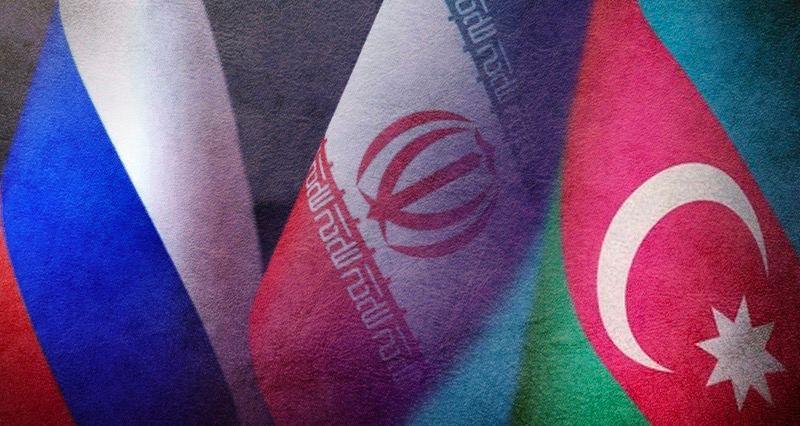Iran desires Russian gas transit, with Azerbaijan standing as Caspian nexus

Although Azerbaijan’s “uneasy” neighbors, Russia and Iran, have recently voiced mixed, sometimes even threatening political rhetoric, the economic processes in the region appear to be moving in a very different direction. Once again, Azerbaijan finds itself on the verge of playing a pivotal role between these two countries.
Iran has expressed optimism about the imminent launch of Russian gas transportation through Azerbaijan, noting that most outstanding issues with Gazprom have already been resolved.
“Iran hopes that it will be possible to start transporting Russian gas via Azerbaijan in the near future, and almost all issues with Gazprom have already been resolved,” Iranian Ambassador to Russia Kazem Jalali told TASS.
“We hope that this will happen in the near future. We are currently negotiating with Gazprom, and practically all issues have already been resolved. But we need to reach a general agreement on the price. If this issue is also resolved, then everything will be put into operation,” he added.
Earlier, Russian Energy Minister Sergey Sivlyov announced at the 18th meeting of the Russia-Iran Intergovernmental Commission on Trade and Economic Cooperation that the first transportation of Russian gas via Azerbaijan’s existing infrastructure is expected to begin in 2025, with an annual volume of 1.8 billion cubic meters. Although Baku has made no official statement, prior meetings between Iran and Russia touched on this issue.
Iran’s ambitions, however, go much further. Tehran aims to receive up to 55 billion cubic meters of Russian gas annually. However, achieving this goal would require the construction of 1,000 to 1,500 kilometers of new pipelines, which could run through Russia, across the Caspian Sea, or through Azerbaijani territory. This infrastructure project would necessitate an investment of at least $25 to $30 billion. Given Russia's current economic challenges, such an undertaking appears unrealistic. Gazprom, for example, has incurred losses of $21 to $22 billion over the past three years and currently lacks the financial resources to pursue new large-scale projects, including those targeted toward China.
Iran’s own energy sector faces equally severe challenges. Sanctions, underinvestment, and chronic ismanagement have left its oil and gas industry struggling. For years, Iran has imported gas from Turkmenistan, yet even this supply has been unreliable due to unpaid debts. Without substantial foreign investment, Iran risks becoming a net energy importer, a trend already becoming visible.
Investment levels in Iran’s oil and gas sector highlight the problem. While in the 1990s annual investment averaged $18 billion, this fell to $7 billion in the early 2010s and just $3 billion since 2017. Over the last two and a half years, the average has barely reached $6.5 billion annually. Meanwhile, much of Iran’s infrastructure is aging, with 80% of its oil output coming from old fields that are declining by 8–10% per year, according to both Iran’s Oil Ministry and the U.S. Energy Information Administration. According to a paper released by Princeton University, without massive investment, estimated at $240 billion, Iran risks becoming a net energy importer.
Iran also shares 28 oil and gas fields with neighboring states: 15 in the Persian Gulf, 12 with Iraq, five with the UAE, four with Saudi Arabia, four with Qatar, and one each with Oman, Kuwait, and Turkmenistan. These fields account for 20% of Iran’s recoverable oil and 30% of its gas reserves, yet only 15 are operational while 13 remain undeveloped.
If the Azerbaijan transit project is realized, it could also open the door to progress on the long-discussed Trans-Caspian pipeline. With negotiations between Turkmenistan and Azerbaijan gaining momentum over the past few months, Baku is likely to insist that Moscow and Tehran reconsider their stance on the Trans-Caspian in exchange for allowing Russian gas transit. It should be considered that the main factor preventing the implementation of this project is related to Russia and Iran's resistance. When the status of the Caspian was determined, an environmental protocol was also adopted. According to this protocol, all Caspian littoral states had to agree to the construction of communication lines across the Caspian Sea.
This nascent gas corridor positions Azerbaijan as a strategic linchpin, an energy bridge where Moscow and Tehran find common ground, and the timing is favorable. A Trans-Caspian gas pipeline from Turkmenistan and an oil pipeline from Kazakhstan could deliver immense benefits to Azerbaijan for decades. Beyond acting as a transit hub for supplying oil and gas to Europe, Azerbaijan would also stand to profit from refining Kazakh oil and exporting petroleum products—further strengthening its role as a key energy bridge between East and West.
For Baku, it’s a strategic masterstroke. Facilitating Russian gas transit not only provides economic revenue but also geopolitical leverage against Moscow and Tehran. It strengthens Azerbaijan's position as a regional pivot and boosts its negotiating capital on broader energy connectivity projects, including European-bound corridors.
-
Russia gains a reliable, neutral transit route, less constrained by Western scrutiny.
-
Iran secures much-needed winter supplies for its northern provinces, balancing fragile domestic production.
-
Azerbaijan becomes a key beneficiary economically and strategically.
-
The Trans-Caspian pipeline, long stalled by resistance from Russia and Iran, could gain new traction.
Baku’s infrastructure, already home to pipelines like BTC, SCP, TANAP, and TAP, positions it ideally to expand as a transit hub. As Europe disentangles from its reliance on Russian pipelines through Ukraine, Azerbaijan's pipeline network represents part of a broader mosaic for Caspian-Eurasian energy realignment.
Here we are to serve you with news right now. It does not cost much, but worth your attention.
Choose to support open, independent, quality journalism and subscribe on a monthly basis.
By subscribing to our online newspaper, you can have full digital access to all news, analysis, and much more.
You can also follow AzerNEWS on Twitter @AzerNewsAz or Facebook @AzerNewsNewspaper
Thank you!

